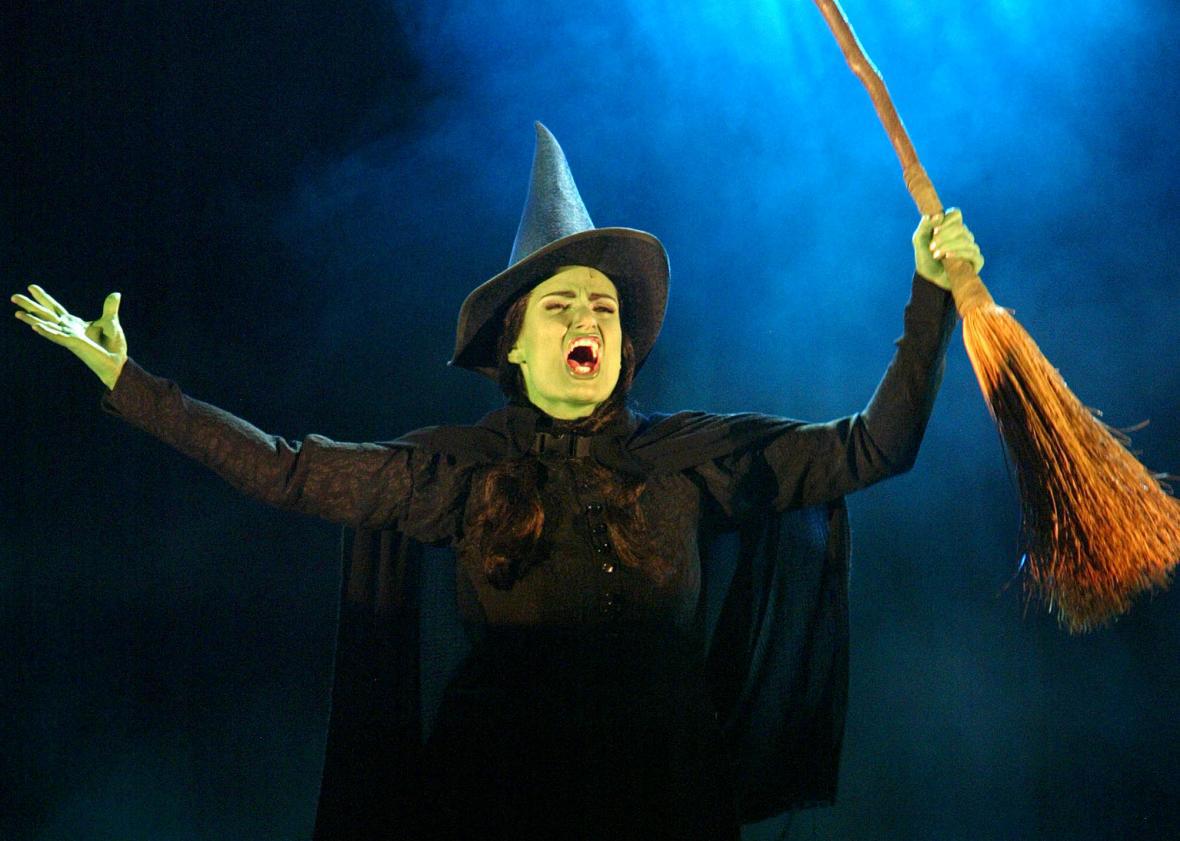This article originally appeared in Vulture.
In TV, movies, and real life, women have been at the forefront of the year’s biggest stories—so this Halloween season, we’re looking at pop culture’s most wicked depiction of female power.
If we’re going to talk about witches, then we have to talk about Wicked, and if we’re going to talk about Wicked—you know, that massive, international theatrical hit revision of The Wizard of Oz—we have to talk about “Defying Gravity,” the big, belt-y centerpiece of the show, which, 14 years out, has established an ambivalent legacy as the silliest, most inspiring, most enduring song in recent Broadway history.
A little backstory for anyone who has, somehow, avoided Wicked (or the rabid young fans it inspired): The musical, based on the novel by Gregory Maguire, imagines a young-adult-style backstory for the witches of Oz. Elphaba, who will eventually become the Wicked Witch of the West, is introduced as a young, green loner and frenemy of the young, blonde Glinda, who will eventually become Glinda the Good Witch. The show, originally led by Idina Menzel and Kristin Chenoweth, premiered in 2003 to unenthusiastic reviews and lost the Tony to Avenue Q. But there’s a special power in Wicked that speaks to people—specifically teen girls, who drove the box office for the musical and led it to become, as of now, history’s second-highest-grossing Broadway show.
What makes Wicked work—and it can really work—is its thundering earnestness, best demonstrated in “Defying Gravity,” the grand Act One finale perfectly calibrated to get everyone to stick around for Act Two. In it, Elphaba finally decides to strike out on her own, and she demonstrates this by hitting a bunch of high notes while literally taking flight, thanks to some clever cherry picker–propelled stage work (which sometimes fails, in infamous and hilarious “no-fly” shows). The emotional through line in the song is at once simple and universal: Elphaba finds power through her own outsider status, and everyone loves outsiders, especially if they’re fictional.
The climax of the song is its Seriously High Note—or really, the series of notes—at its dramatic conclusion: A loud, screamy, “Bring me dowwwwwwwwwwwwn,” followed by an “aHHAAAAAhhh” riff that reaches, somehow, even higher. Whether you’re singing in the original key or transposing the song, this is pretty much supposed to destroy your vocal chords. That’s part of the appeal: Nobody, with the exception of Idina Menzel and her subsequent Elphabas, can really sing this song. It is aspirational for a few, and impossible for most. Singing “Defying Gravity” makes you an outsider, a wannabe, by default.
But a rendition of “Defying Gravity” is even better, or at least more compelling, in my opinion, when the singer can’t hit these notes, but retains the pathos that comes with reaching for them. Think of when Kurt purposefully flubbed the song in Glee, or, in my personal favorite rendition of the song, when Amy Adams performed it at karaoke at a gay bar, clawing ever so close to nailing that note, but ultimately missing the mark (a trademark move of hers). This is why the song also fits so well within the structure of televised singing competitions, built as is it for showing off maximal emotion and maximizing the potential for embarrassment. And if you went to high school in the mid-2000s, you know that no talent show was complete without at least one attempt at “Defying Gravity” (bonus points if someone else also did “No Good Deed,” or there was a group rendition of “Popular,” led by someone who was not). Perhaps that’s what makes the song, and the musical, stick: It convinces you that if you feel something strongly enough, you might be able to float. Spoiler: You tend to stay on the ground.
So over the years, the song has cemented itself in our most earnest and humiliating spheres of popular culture, thanks to Idina Menzel’s pneumatic lungs and the powerhouse performances of the divas that followed—and also thanks to everyone else who couldn’t match them but tried their very best. And inevitably, along the way Wicked, and specifically “Defying Gravity,” became funny. The show, still doing well in theaters, is a useful reference for Broadway Über-schmaltz, referenced in everything from The Simpsons to Ugly Betty. Winston sang along to it in the car with tears streaming down his face in New Girl. My favorite riff on its legacy probably comes from Reductress, which, in the summer of 2017, published an excellent post titled “10 Hot Summer Songs That Are All ‘Defying Gravity’ From Wicked.” It’s the kind of song you might be embarrassed to love, but love anyway; the kind of thing you should grow out of but never do, like enjoying boy bands or believing in love. Not that embarrassment is going to bring you down.
After Wicked’s premiere, something had changed on Broadway. More than a decade out, we’ve got several similarly teen-targeted musicals on the way, based on Bring It On, Legally Blonde, Anastasia, and soon, Mean Girls; “Defying Gravity”–esque belt-y songs feel more common than ever. “Let It Go,” another Idina Menzel song from another story about two mismatched women, is now the Act One finale of Frozen, coming to Broadway this spring. But “Defying Gravity” floats above it all, the Ur-song—too big, too high, too much. I can’t stand it. It’s already stuck in my head.
